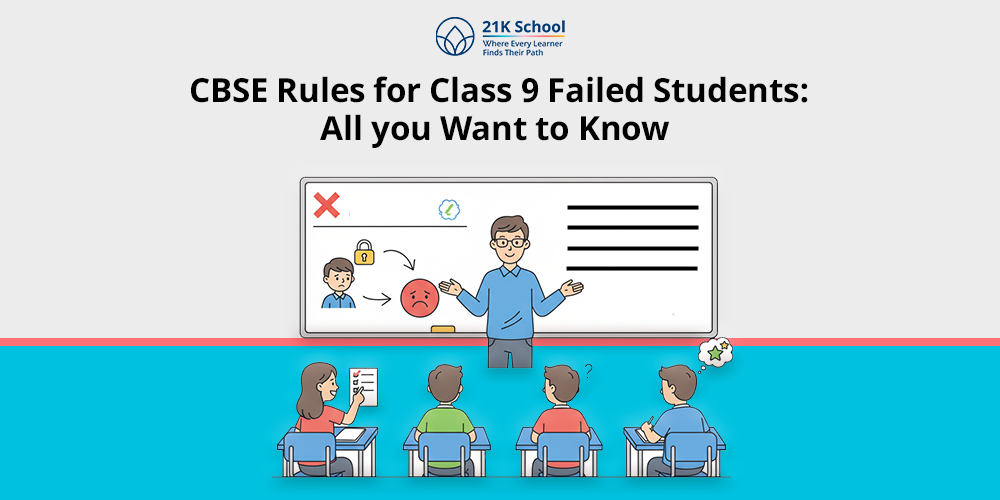
If you have landed in this article, you might be someone who’s confused or scared after failing class 9th CBSE .
Without a second thought, it is evident that class 9, even when it does not end in board exams, is a crucial part of students’ future and promotions.
But what if we failed in some subjects in class 9? Will we have to reappear in the exams or how will we get promoted now to class 10?
In this article, every answer to your questions related to rules and norms followed in CBSE for class 9th passing criteria, options for failed students and other details are provided.
So, let’s quickly look through them.
Contents
CBSE’s Formal Rules and Guidelines for Class 9 Failed Students
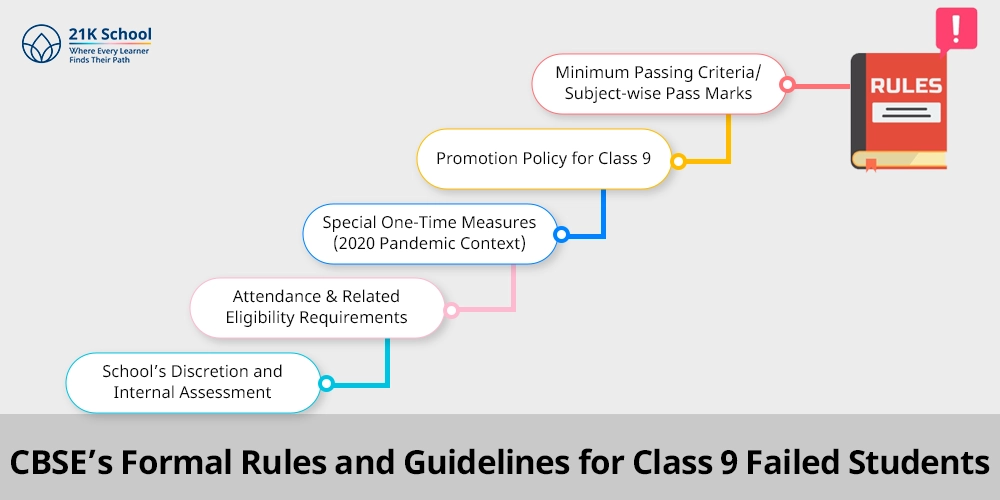
CBSE has made certain rules and guidelines that have to be followed by each CBSE school in India.
For class 9th, the regulations are designed as:
1. Minimum Passing Criteria/Subject-wise Pass Marks
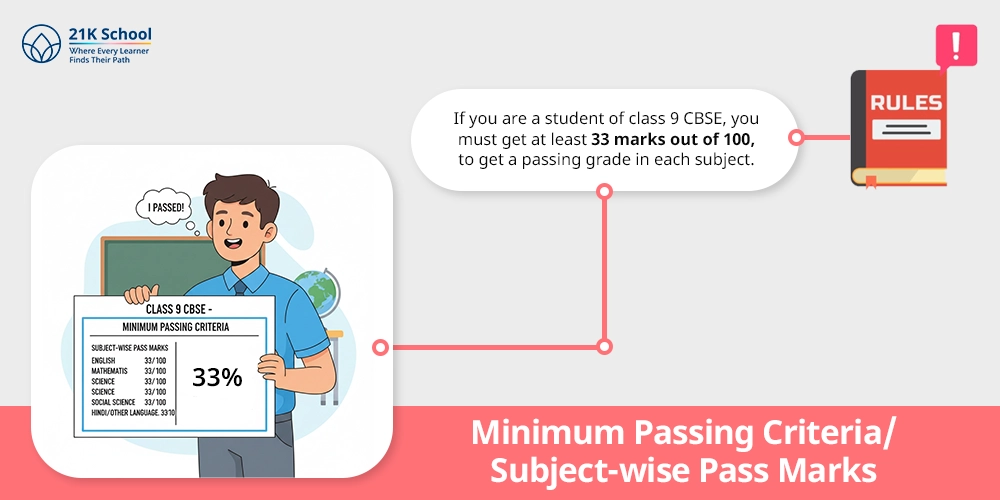
If you are a student of class 9 CBSE, you must get at least 33 marks out of 100, to get a passing grade in each subject.
A grade lower than D is considered as failing in CBSE class 9th, so your grades like E1 or E2 are not enough to get you promoted to the next session of yours.
Also, these passing grades should be above D for at least 5 main subjects out of 6.
Another point that needs your attention includes the no-detention policy that prevented students from failing applied only to Classes 1-8 under the RTE Act.
Class 9 students have always been subject to detention for failing.
Other than that, if your result shows less than 33% in any 5 main subjects, there are huge chances of you remaining in the same class.
These marks distribution for internal assessment (20 marks) includes periodic tests (10 marks), notebook submissions (5 marks), and subject enrichment activities (5 marks).
These are conducted differently by different CBSE affiliated schools.
Explore what is the passing mark out of 50 and passing mark out of 80 in cbse .
2. Promotion Policy for Class 9
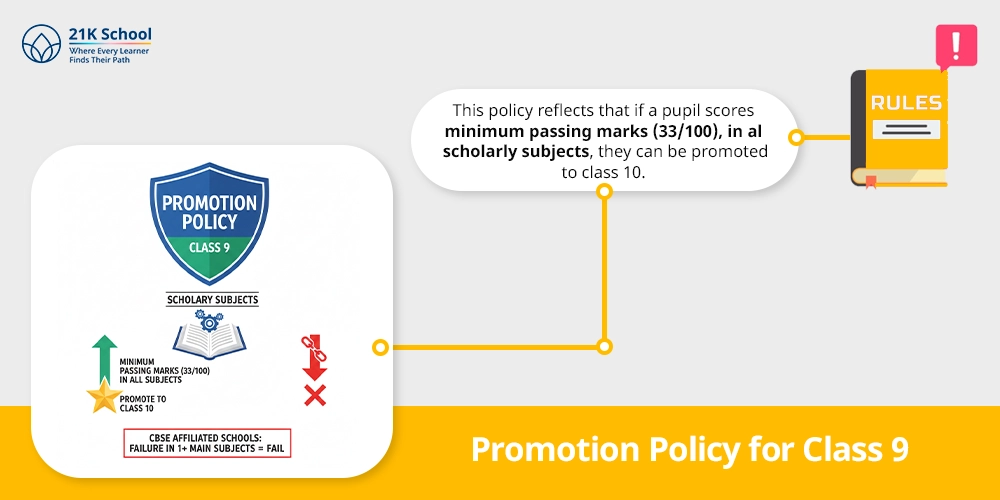
Class 9 promotion policy reflects that if a pupil scores minimum passing marks (33/100), in all scholarly subjects, they can be promoted to class 10.
CBSE affiliated schools mostly follow the rule that if a student fails in one or more main subjects, he might fail completely.
In these situations, children are given another opportunity to reappear once more in cbse improvement exams , so that their education continues.
But even after this, if the student is incapable of scoring the desired marks, they are considered to have failed.
Promotion policy also includes other factors like attendance and eligibility that should be according to what’s needed.
In 2020-22, special actions were taken to delimit the educational goals of children during COVID pandemic and student mental health was also taken care of.
3. Special One-Time Measures (2020 Pandemic Context)
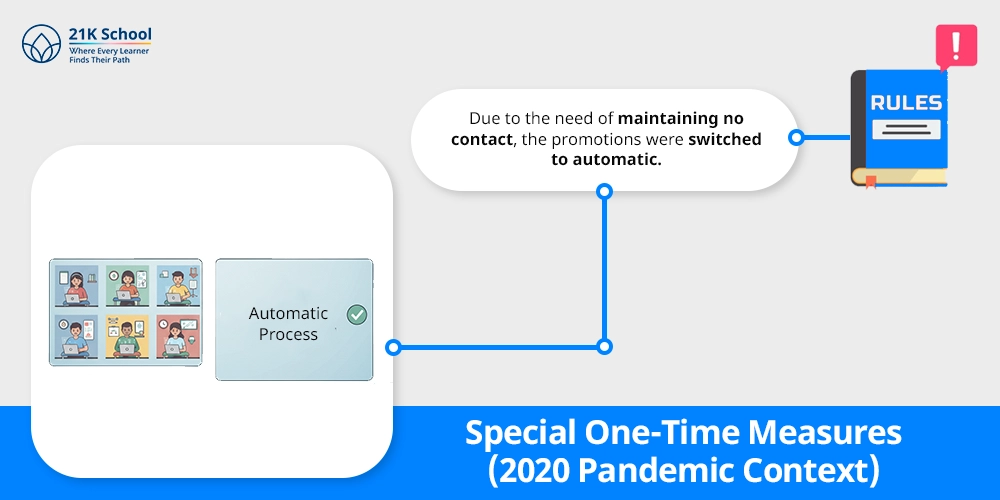
When Covid-19 pandemic came, (educational systems, boards, examination systems), everyone was confused about exam conduction and result declaration.
Due to the need of maintaining no contact, the promotions were switched to automatic.
These were based on internal assessments , practical marks, and mock tests taken, as in most schools final exams were not conducted.
To facilitate these promotions, 15 grace marks were given specifically following a Delhi Directorate of Education policy for 2020-21 and 2021-22. So that they could reach minimum criteria of 33 marks in their result papers.
For students who could not satisfy such criteria, and had failed in language subjects, a third language subject with better marks were also put to consideration.
This was a temporary access because of a special pandemic scenario and has stopped presently. And today everything is back to normal guidelines and regulations.
4. Attendance & Related Eligibility Requirements
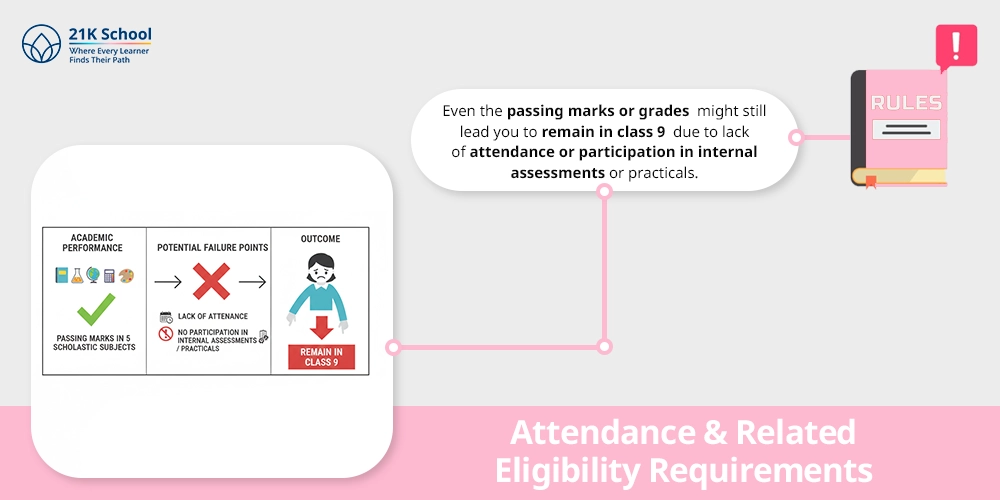
Even the passing marks or grades in 5 scholastic subjects might still lead you to remain in class 9 as a failure.
This can simply be due to lack of attendance or participation in internal assessments or practicals.
The 75% attendance requirement for Class 9 is not as strictly formalized as it is for Classes 10 and 12, though schools generally follow similar guidelines. Learn how much attendance is required for Class 10 cbse .
And not just that, when the student fails poorly in given internal tests, and performance-based exams, even after getting passing marks in main exams, still they won’t be transferred further.
5. School’s Discretion and Internal Assessment
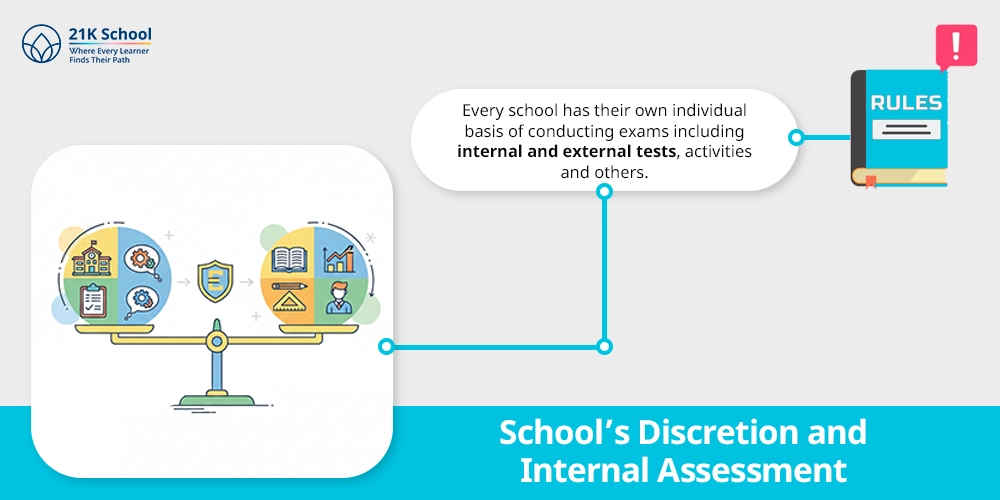
Every school has their own individual basis of conducting exams including internal and external tests, activities and others.
Though all of them have to strictly follow CBSE/DoE directions.
This only means that schools need to include both scholastic and co-scholastic ways of assessing students.
Schools also give the opportunity of retests and remedial classes for learners who might have failed in main exams, thus assuring their another chance for promotion to class 10.
This suggests that parents and students should also be serious about periodic tests, practicals, and viva, similar to main term-exams.
Practical Implications for Class 9 Failed Students
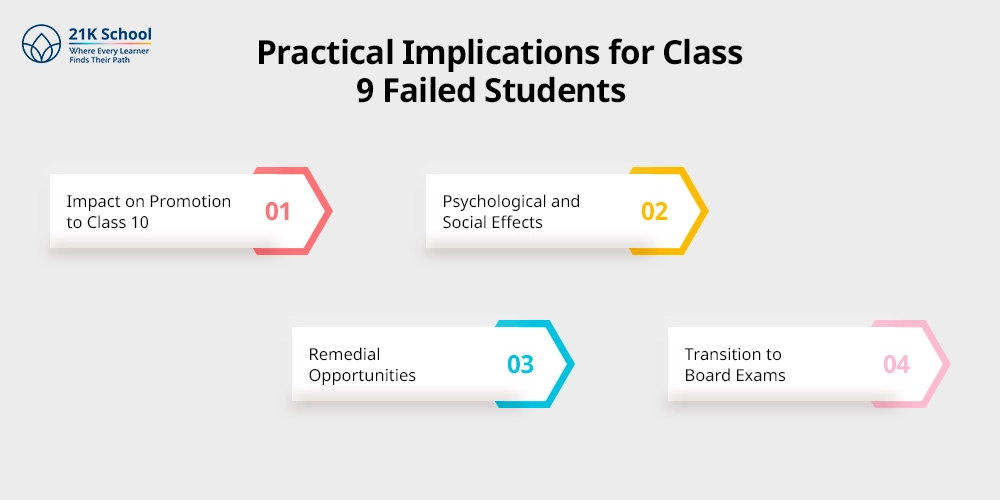
According to the CBSE board, there can be certain negative effects on life and career plans of students, if they fail class 9th.
These are as under:
1. Impact on Promotion to Class 10
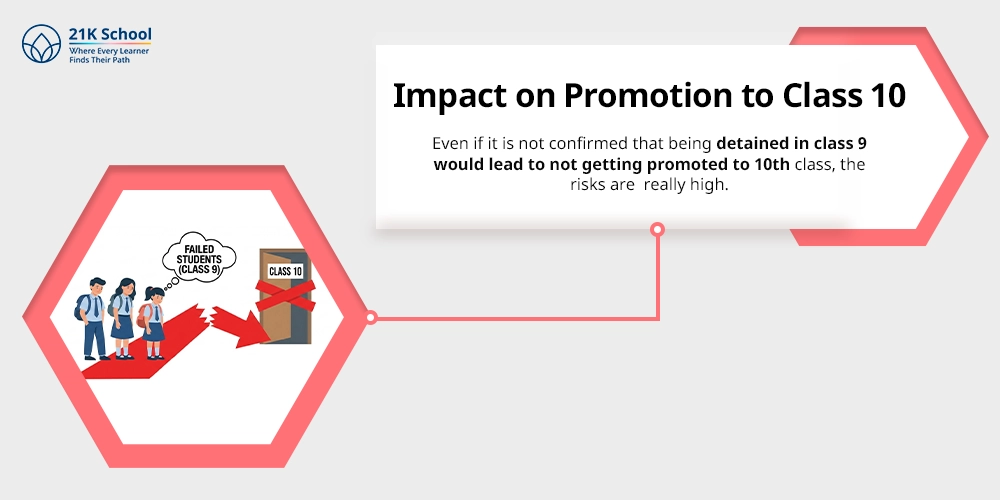
Even if it is not confirmed that being detained in class 9 would lead to not getting promoted to 10th class, the risks are really high.
If schools do not have a policy of taking retests, learners who fail once might get stuck in class 9 for one whole year.
Repeating an entire year can be challenging mentally, emotionally, and financially for parents as well as students.
And learning the same syllabus while sitting with juniors can impact in forming learning gaps and inappropriate skill development for class 10.
Also read, the importance of skill development in school education .
This is why, class 9 is emphasized to be taken seriously by your teachers and parents, and therefore you should take it seriously.
2. Psychological and Social Effects

It might be embarrassing and really demotivating to attend classes for students who sit for the same class (class 9 here) for another year.
They might feel that they are left out while their other friends have passed and admitted to class 10.
They also might exclude themselves from student participation activities.
These situations can only be dealt with great resilience , understanding, and commitment to come back stronger.
The added pressure from parents and educators can be reduced if attention and care are given instead to their children.
3. Remedial Opportunities

Schools also organize remedial classes that are planned by schools to help students who fail in Class 9 get promoted to Class 10.
If these classes are taken seriously and improvement exams are given afterwards, there are chances that students might get admission in class 10th.
These classes are created to help students and include well-planned revisions targeting weak areas of students’ learning .
Proper actions to bring positive shifts within time can be truly beneficial for learners.
4. Transition to Board Exams
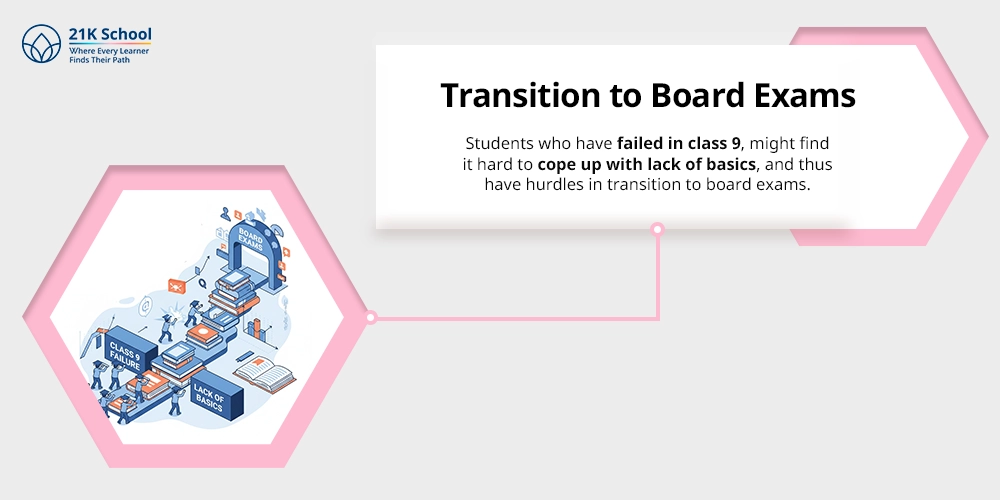
Board exams are a crucial part of students’ lives.
Students who have failed in class 9, might find it hard to cope up with lack of basics, and thus have hurdles in transition to board exams.
Starting from language to more complex subjects, Class 9 lays the foundation for appearing in class 10th board exams.
All the study habits , strict study routines and other life skills needed in passing board exams are acquired in class 9th only.
Therefore class 9 should be taken as an aim that is worthy.
Why the Rules Matter and Why Students Should Not Ignore Class 9?
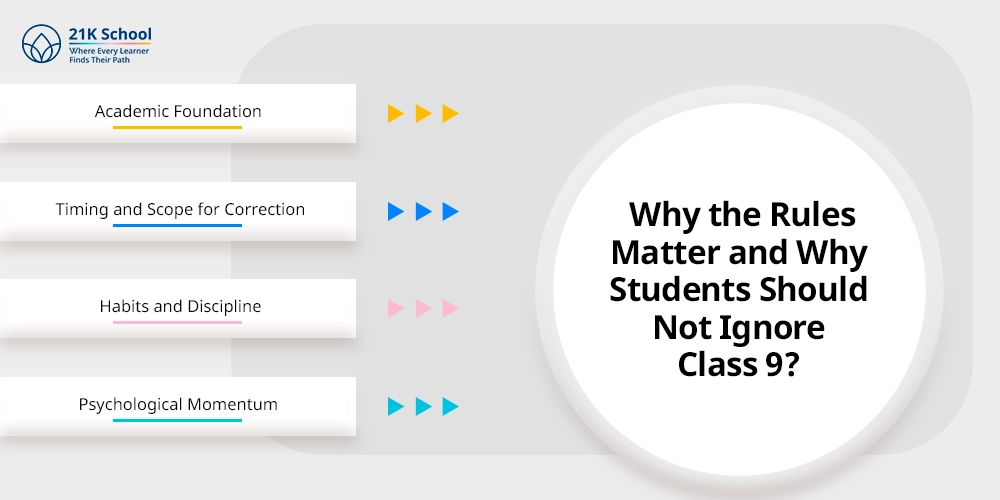
Rules and regulations that are followed with strictness are not just for talking.
There are several reasons why these rules matter and why students should take Class 9 seriously.
1. Academic Foundation

As already mentioned, class 9 lays the foundation of your academic relevance and achievements.
From developing language skills to gaining a deeper understanding of tough subjects like maths, science, or social studies also come along.
These subjects are expanded upon in 10th class, which requires conceptual clarity since the start.
2. Timing and Scope for Correction

Another advantage of following class 9 rules is that you get a bit of time to identify areas for improvement in your thought processes, time distribution, and creating a new study plan .
If you directly go to the board exams years without actually having the abilities to deal with it, it would be a waste.
Sooner the changes are done, quicker will be your progress in academics as well as in practical life.
3. Habits and Discipline
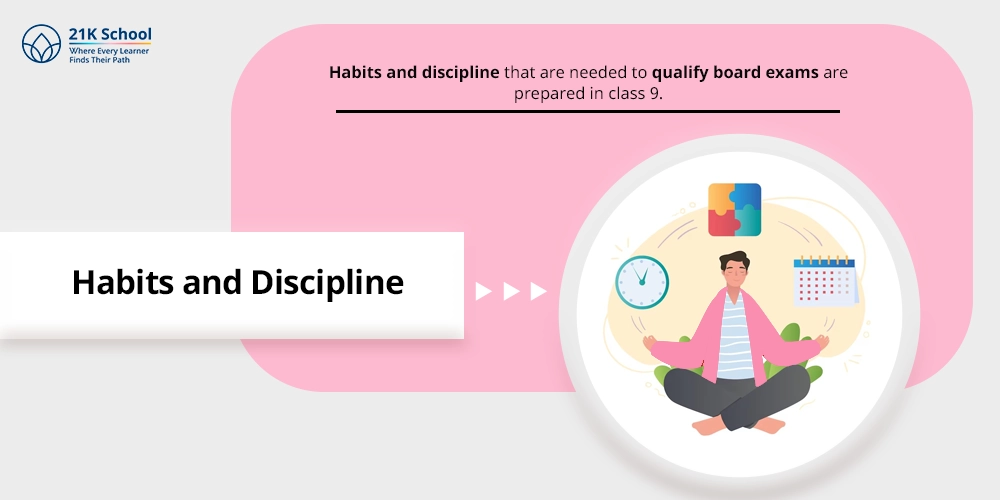
Habits and discipline that are needed to qualify board exams are prepared in class 9.
In fact, the hard work you do to build healthy habits and a structured student discipline work as a lifelong learning in later periods of life.
4. Psychological Momentum

Until class 8, most learners feel relaxed as there is nothing to worry about like boards.
Class 9 functions as a breaker that provides psychological momentum to bring up all the hidden potential of learners.
They get well-equipped to do their best in board exams due to intentional learning practices and hard work.
Recommendations for Students, Parents and Schools

The main focus of everybody including learners, schools, or parents should be to clear class 9 exams in one go.
Repeating a year can be drastically impactful for children.
Students should pay attention to classes, activities and internal tests taken in class 9, and prepare well for the upcoming exams .
Indulging too much into friendships can deviate you from your goals.
Parents should hold space for their children to express themselves and learn further.
Even if they have failed in one or more subjects in class 9, they should assist them in performing better in remedial tests.
Schools need to follow strict rules from CBSE for exam conduction and result declaration, though internal policies might differ slightly.
It is crucial to note here that In 2024, the Centre amended RTE rules , allowing 16 states and 2 UTs (including Delhi) to end the no-detention policy for Classes 5 and 8.
Sum It Up
The rules and guidelines that are a part of class 9 admissions and exam conduction are generic and supportive.
For that, schools provide a simple study plan and guidelines that need to be followed anyhow.
Students who fail class 9 exams, might need remedial classes which are also helpful in passing exams and scoring minimum passing marks.
The remedial classes and papers organized are also a part of these regulations and thus need to be given with honesty.
So instead of sitting like a confused individual excel in all class 9 subjects.



